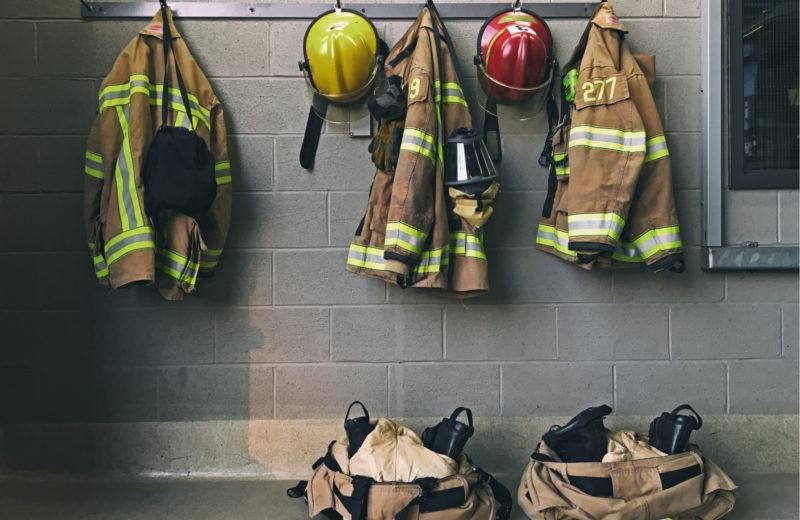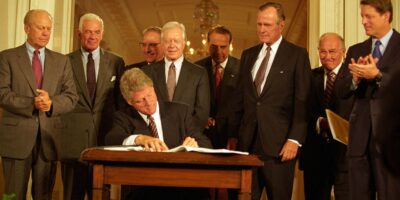If the Government Doesn’t Do It, Who Will?

“If the government doesn’t do [X], who will?” It’s a good question, and it’s a fair one. We rely on governments for a lot of things, like police and fire protection. One of the classic objections to libertarianism is “who would build the roads?” And of course, there’s “what about the poor? Can we guarantee that people wouldn’t slip through the cracks if we didn’t have a large and robust welfare state?” Can we imagine a world in which the government wasn’t in charge of fire protection? Police protection? Roads? Welfare? Yes, actually, we can—and we can look to history for examples of the market mechanism working well. Was it perfect? No, but as Deirdre McCloskey has pointed out, it’s probably a mistake to turn an imagined best into the enemy of an actually pretty good. Here are some examples.
Fire protection
Fire protection looks like a classic case of spillover benefits. These are: if your house is burning, it raises the likelihood that my house burns, too. As a 2010 example in Tennessee shows, however, fire protection can be a private good. If you don’t pay your water or power bills, your water and power get shut off. If you don’t pay your fire department bill, then perhaps you shouldn’t be surprised when the firefighters don’t respond while your house burns to the ground.
But what about densely-packed cities where a small conflagration can lead to a city-wide disaster, as has happened in places like Chicago and San Francisco? As Fred McChesney argues, municipal fire departments were basically takeovers of the private sector in order to create patronage jobs for political allies. Private, volunteer companies were getting the job done for the most part. Until political entrepreneurs noticed a way to obtain power and resources for themselves by taking over previously-private volunteer fire departments and creating reliable unionized voting blocs.
Maybe it’s not optimal. Maybe the market left to its own devices will under-provide. As Milton Friedman and so many others have argued with respect to education, this might be an argument for government subsidy. It is not an argument for government provision.
Police protection
In his 2015 book Private Governance, which he discusses in this 2015 essay for Cato Unbound, Trinity College economist and AIER president Edward Stringham explores the ways that (wait for it) private governance has evolved in markets for financial securities on stock exchanges and property protection in cities like San Francisco. As he puts it, “Judges, police, and regulators are a deus ex machina” in a lot of social scientific theorizing. And what is a deus ex machina? It is ”a person or thing (as in fiction or drama) that appears or is introduced suddenly and unexpectedly and provides a contrived solution to an apparently insoluble difficulty.” If you grew up watching Inspector Gadget cartoons as I did, you might think of it in terms of a simple incantation: “go go gadget government!” Our gods from the machine, however, have their own incentives and goals that are far too often ill-aligned with the common good.
We rely, however, on private provision of rules and enforcement all the time. Disney, for example, has its own police force at Disney World. Malls and banks have security guards. Bars have bouncers. Amazon, eBay, and other online retailers have terms of service and technologies that allow them to process thousands of transactions every second. We don’t have to imagine private rule provision and police protection. We can see it all around us.
Once again, the free market left to its own devices might not provide the “optimal” amount. If this is the case, though, then policing vouchers would be preferable to government provision.
Welfare
We also see private welfare all around us—indeed, our charitable impulses are so strong that there is a small cottage industry of commentary on the “second disaster” in floods of borderline-useless emergency relief supplies land in disaster-stricken areas and get in the way of the people who are doing the most effective work. After the 2010 Haiti earthquake, NYU’s Development Research Institute published a very useful post entitled “Nobody wants your old shoes: How not to help in Haiti.”
There are a couple of replies to this. First, there’s a strong argument to be made that a weaker state would mean fewer people needing welfare in the first place. In a 2013 paper in the Journal of Economic Growth, John W. Dawson and John J. Seater point out that a growing regulatory state has meant lower productivity growth and, therefore, lower standards of living ($0 version of their paper here). They attribute the productivity growth slowdown that began in the 1970s to changes in regulation, and this makes a certain degree of sense in light of the regulatory “victories” of the 1970s like the Environmental Protection Agency and the Occupational Safety and Health Administration.
Even then, there is a lot of evidence that historically, we have done a pretty good job of taking care of one another. First, there’s the institution of the family. Adult children can take care of their aging parents, and they typically have. Even then, people could undoubtedly earn a much higher return on investment by putting the share of their earnings that are going into Social Security into the stock market. Second, there is the private sector. The historian David Beito’s From Mutual Aid to the Welfare State and the economist John E. Murray’s Origins of American Health Insurance explore how friendly societies, mutual aid societies, and other private-sector organizations provided formal and informal insurance in the years before the welfare state. Industrial sickness funds, Murray argues, handled medical issues reasonably well, and he argues specifically that the reason the US didn’t get a European-style welfare state was not because of the machinations of insurance companies but because private alternatives were working.
Roads
We return to the classic objection: what about the roads? Again, there are arguments for government provision or financing of roads. However, it’s not at all clear that roads cannot, in the main at least, be provided privately. Daniel Klein and John Majewski make this point in the context of 19th century US turnpikes and toll roads. Economist Dan Bogart has studied transportation innovation and argues, for example, in an important 2005 paper that private “turnpike trusts increased road expenditure, rather than replacing existing or forthcoming parish expenditure.”
As with police and fire services, maybe the unfettered free market doesn’t provide the optimal amount of road or rail. But again, this is not so much an argument for government provision as it might be an argument for government subsidy—and only then if we are pretty sure the interventionist cure won’t be worse than the disease.
Governments have been providing fire protection, police services, roads, and other public services for pretty much our entire lives. If you have never known a world in which the government hasn’t provided it, then it’s understandable that you might not think it is possible for the market to do it. These examples, at least, are useful proofs of concept. The next time you wonder “who will build the roads” or “who will fight the fires” or “who will fight the bad guys” or “who will take care of the poor and indigent,” remember that free people in free markets have a pretty good track record.










